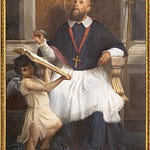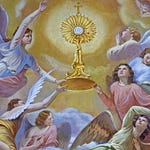Consider the happy death of a Religious.
Blessed are the dead who die in the Lord (Apoc. xiv. 13). And who are those blessed dead who die in the Lord if not Religious, who, at the end of their lives are found already dead to the world, since they have by their Vows already detached themselves from the world and all its goods. I leave all and choose Thee alone for my Treasure, O most pure Lamb of God and my most ardent Lover!
I.
Consider, my brother, your contentment, if following your Vocation, it will be your good fortune to die in the House of God. The devil will certainly represent to you that if you retire into the House of God, you may perhaps afterwards repent of having left your own house and your own country, and deprived your parents of the advantages which they might have expected from you. But ask yourself: Shall I, at the point of death, be sorry, or shall I rejoice at having followed my resolution? I beseech you therefore to imagine yourself already at the point of death, about to appear before the Tribunal of Jesus Christ. Reflect what, when reduced to that state, you would wish to have done. Perhaps to have pleased your parents, to have worked for your own family and your country, and then to die surrounded by brothers, and nephews, and relatives in your own house with the title of Pastor, Parish Priest, Canon, Bishop or a Minister of State, having done your own will? Or, on the other hand, to die in the House of God, assisted by your good brethren in Religion, who would encourage you in the passage to eternity, after having lived many years in Religion, humble, mortified, poor, far from parents, deprived of your own will and under obedience, and detached from everything in the world -- all which render death sweet and agreeable? "He who has been accustomed to deprive himself of the delights of the world," says St. Bernard. "will not regret having done so when he has to leave it." Pope Honorius II., when dying, wished that he had remained in his monastery, occupied in washing the plates, and had not been Pope. Philip II. wished at his death that he had been a lay-brother in some Religious Order, intent on serving God, and had not been a king. Phillip III, also King of Spain, said when he was dying: "Oh, that I had been in a desert, there to serve God, and that I had never been a monarch! For, had such been the case, I should now appear with more confidence before the Tribunal of Jesus Christ."
O my Lord Jesus Christ! Who, in order to obtain a happy death for me, hast chosen so bitter a death for Thyself -- since Thou hast loved me to such an extent as to have chosen me to follow more closely Thy holy life, to have me thus more intimately united with Thy loving Heart, bind me, I beseech Thee, wholly to Thee with the sweet cords of Thy love, that I may no more separate myself from Thee. O my beloved Redeemer! I wish to be grateful to Thee, and to correspond with Thy grace, but I fear my weakness may render me unfaithful. O my Jesus! Do not permit this. Let me die rather than abandon Thee, or forget the peculiar affection Thou hast shown me.
II.
When, then, hell tempts you about your Vocation, think of the hour of death, and set before your eyes that all-important moment upon which eternity depends. Thus you will overcome all temptations; you will be faithful to God; and certainly you will not repent of it at the point of death, but will give thanks to the Lord, and die contented. Gerard, brother of St. Bernard, died sighing at the very thought of dying in the House of God. Father Suarez, of the Society of Jesus, felt at his death so great consolation and sweetness at dying in Religion that he said: "I never thought it would be so sweet to die." Another good Religious, of the same Society, laughed when at the point of death; and being asked why he laughed, answered: "And why should I not laugh? Has not Jesus Christ Himself promised Paradise to him who leaves everything for His sake? Was it not He Who said: Everyone that has left house, or brethren, or sisters, or father, or mother, or wife or children or lands for my name's sake, shall receive a hundred-fold, and shall possess life-everlasting? (Matt. xix. 29). I have left all for God; God is faithful, He cannot fail in His promises; and so," he said, "why should I not rejoice and laugh, seeing myself assured of Paradise?" A certain Lay-brother, who died some years ago, was asked, at his death, what he desired most? He answered: "I desire nothing but to die and to be united with God."
Father Januarius Sarnelli, a short time before his death, when conversing with God, was heard saying: "O Lord, Thou knowest that all I have done and all I have thought, has been for Thy glory; now I wish to go to see Thee face to face, if it please Thee so." And then, desiring his departure, he said: "Courage, I wish to enter into a sweet agony." He then began to converse affectionately with God, and shortly after placidly expired. There was a smile on his lips, and from his body came a sweet odour, which, as many attested, remained for several days in the room in which he had died.*
St. Bernard, speaking of the happy state of Religious, had good reason to exclaim: "O secure life, in which death is expected without fear -- yea, sweetly desired and devoutly accepted!"
I love Thee, O my Saviour! Thou art and shalt always be the only Lord of my heart and of my soul. I leave all and choose Thee alone for my Treasure, O most pure Lamb of God. O my most ardent Lover! My beloved is white and ruddy, chosen out of thousands (Cant. v. 10). Begone, ye creatures, my only Good is my God, He is my Love, my All. I love Thee, O my Jesus! and in loving Thee I will spend the remainder of my life, be it short, or be it long. I embrace Thee, I press Thee to my heart, and I wish to die united to Thee. I wish nothing else. Make me live always burning with Thy love, and when I shall have arrived at the end of my life, make me expire in an ardent act of love towards Thee.
Immaculate Virgin Mary, obtain this grace for me, I hope it from thee.
*The Ven. Father Januarius Sarnelli, C.SS.R. was one of the first companion of St. Alphonsus. He died in the odour of sanctity in the year 1774, and the Cause of his Beatification has been introduced. EDITOR













Share this post